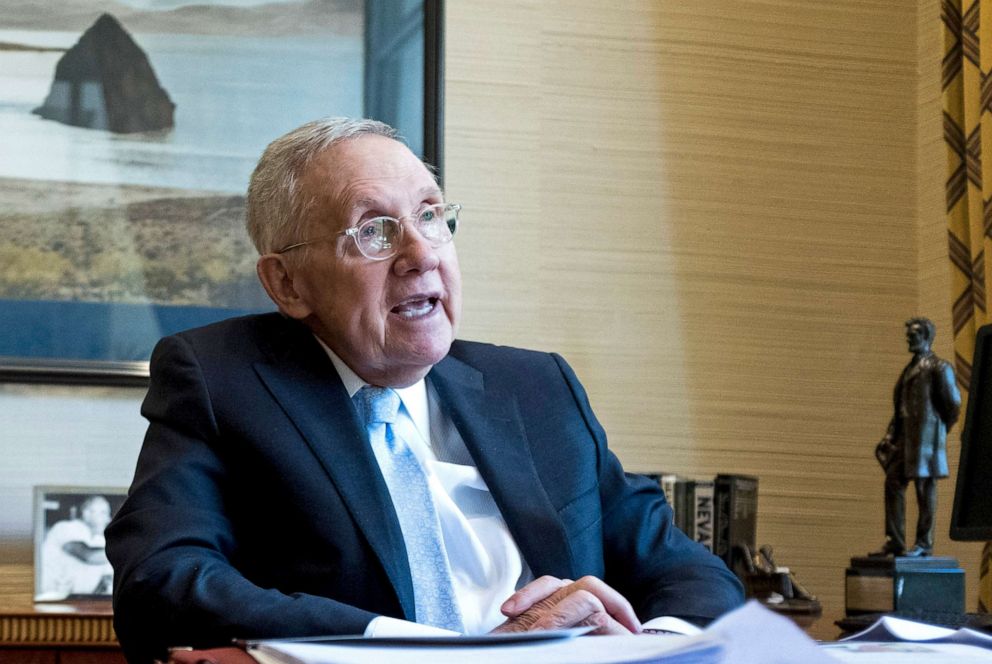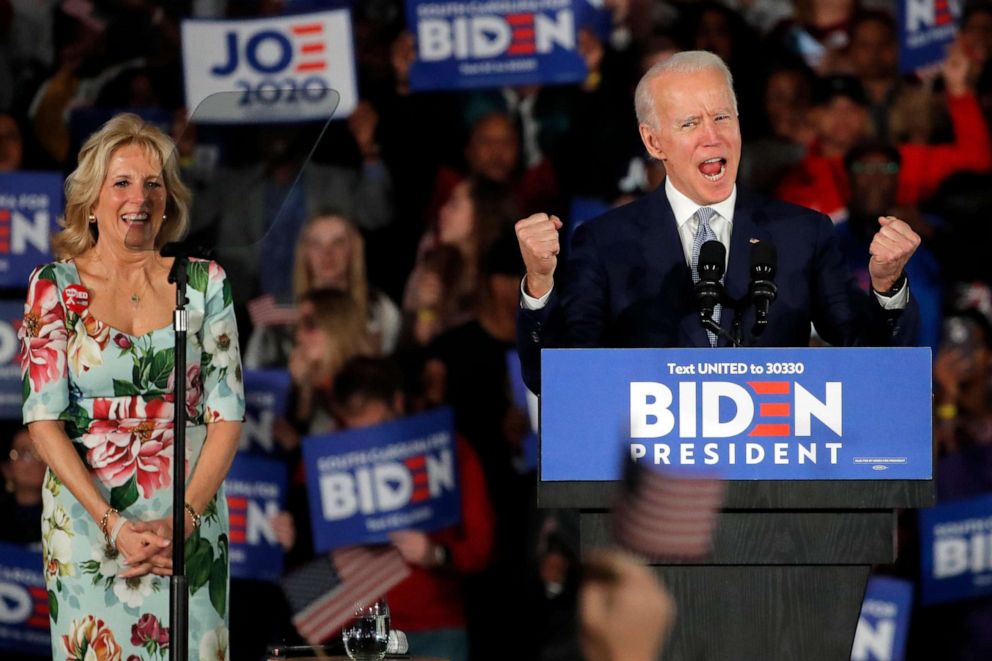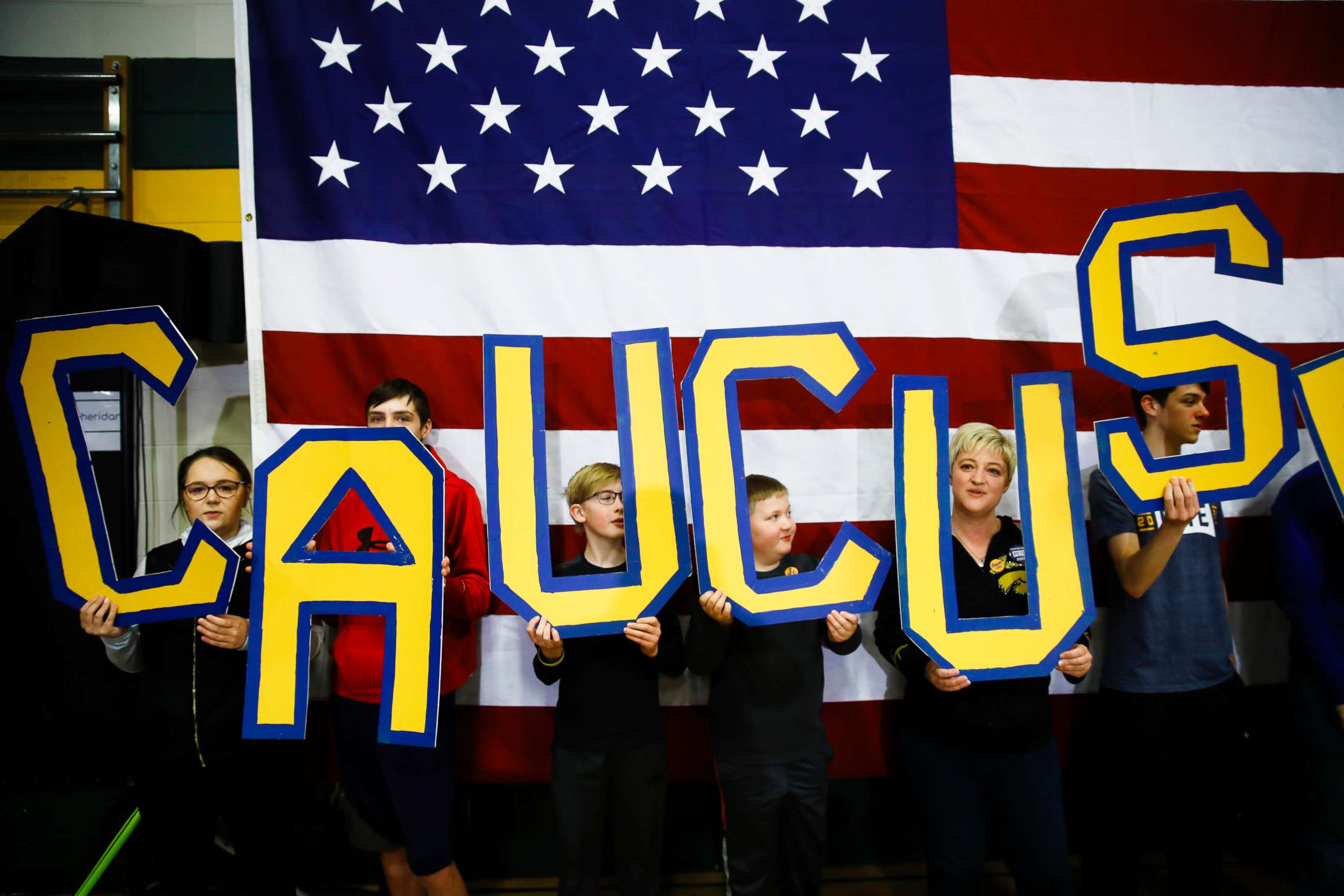The first 4 early states start scramble to lead 2024 primary calendar
"South Carolina and Nevada should be the first two," said former Sen. Harry Reid
Before the not-so-subtle trips to the first voting states or the string of announcements from 2024 presidential hopefuls, a drawn-out clash is dividing the four early states down the middle.
In Nevada, Democratic Assembly Speaker Jason Frierson introduced a bill last week to position the state at the front of the line. The maneuver could erode the decade-long détente between the privileged four, which wield outsize influence over the nominating contests, with Nevada and South Carolina angling for the top two positions occupied for nearly half a century by Iowa and New Hampshire.
"I think that South Carolina and Nevada should be the first two," said former Senate Majority Leader Harry Reid, a Democratic power broker who is the driving force behind the concerted push in Nevada.
He would be "satisfied," he said, if either Nevada or South Carolina claimed the top spot, even if that means his home state landed in second -- a signal that along with House Majority Whip Jim Clyburn, who shares Reid's interest in moving up South Carolina's primary, the two states could work in tandem to displace Iowa and New Hampshire.
"Those states are not representative of what's going on in 90% of the rest of the country," Reid continued. "Just because you've done something in the past, doesn't mean you should do it in the future."

For the two predominantly white states, who for years have successfully survived attempts from others to jump ahead, the legislation in Nevada marks an early, but not unforeseen, attack on their entrenched position of prominence on the primary calendar.
Although Iowa and New Hampshire are familiar with being on defense, they now find themselves in a far more beleaguered position after a turbulent 2020 Democratic primary. The bungled Iowa caucuses last year, the stunning revival of then-candidate Joe Biden's campaign in South Carolina and repeated calls from inside the party to reshuffle the calendar to reflect the diversity within the Democratic electorate are temping some Democrats away from tradition and leaving the early states preparing for war, whether intended or not.
"Every four years, this process really kicks up again where states jockey for position," said Iowa state Rep. Ross Wilburn, the newly elected chair of the state Democratic Party. "We're committed to doing whatever it takes to keep Iowa first-in-the-nation."
In New Hampshire, Bill Gardner, the longtime secretary of state who has sole authority to set the date of the primary, indicated that he is prepared to once again outmaneuver others to keep his state's prime position. He did not rule out waiting until the eleventh hour to schedule New Hampshire's contest ahead of all other states.
"The law says it can be in the year of the presidential election or earlier," he said in an interview, referring to a state law mandating that the New Hampshire primary be held seven days before any other "similar election." Iowa, too, must hold its caucuses at least eight days before any other nominating contest, according to state law.
Gardner said that the size of New Hampshire and the level playing field it offers, coupled with the historical traditions that cannot be recreated elsewhere reinforce the state's claim to leading off voting.
"The primary here is really an opportunity for the little guy to have a chance to compete. You don't have to have the most fame or fortune to win here," he said. "It's natural that it's here like it's natural that a Kentucky Derby is in Kentucky."
Democrats outside of Iowa and New Hampshire often criticize the current lineup of the calendar for giving too much power to homogeneous states, since their populations are roughly 90% white, particularly for a big-tent party that featured the most racially diverse field of candidates competing for the nomination last cycle.
"A diverse state or states need to be first. The difference between going first and going third is really important," Tom Perez, the former chair of the Democratic National Committee, told the New York Times earlier this month. "This is the Democratic Party of 2020. It's different from the Democratic Party in how we were in 1972. And we need to reflect that change."
The bill in Nevada shifts the state's nominating contest from a caucus to a primary and moves the date of the primary to "the Tuesday immediately preceding the last Tuesday in January'' -- laying the foundation for the state party to make the case before the DNC that Nevada should be first. Before the bill was released, the state party chairs in the three other early states were given a courtesy heads up by William McCurdy II, the chair of the Nevada Democratic Party, a party spokesperson said.
But between approvals from the statehouse and both party committees, the process for upending the shape of the nominating contest and the decades of tradition that define it is not an easy one. President Joe Biden, who holds significant sway over the next primary calendar as the leader of the party, has not weighed in on the debate, and White House press secretary Jen Psaki said earlier this month it was "too soon" and they don't have "any point of view to share" on the outline of the contests yet.

Biden's own unusual path to the nomination bypassed Iowa and New Hampshire, where his disappointing finishes in the first two states left his campaign on the ropes. It wasn't until the fourth contest in South Carolina, where he earned Clyburn's endorsement and overwhelming support among Black voters in the state that his campaign proved resilient.
DNC Chair Jaime Harrison, a former state party chair in South Carolina who was handpicked by Biden to helm the committee, also hasn't signaled which way he's leaning.
"Jaime is not going to put his finger on the scale," said Clay Middleton, a Democrat from South Carolina who is close with Harrison and was named a senior adviser at the DNC after the interview.
Reid said he thinks the party is open to restructuring the calendar.
"Every four years, the DNC looks back at what worked and what didn't work, and the DNC's Rules and Bylaws Committee will continue to evaluate all areas of our nominating process and make recommendations for any changes," said David Bergstein, a spokesperson for the DNC. A meeting before the powerful Rules and Bylaws committee on the issue has not been scheduled yet, but two Democrats said one is expected later this year, in late summer or early fall.
Wilburn, who mentioned he previously spoke with Harrison, said that he is confident Iowa will make a compelling case before the national party and "highlight changes that need to be made to our process." His assessment comes more than a year after Iowa's disastrous caucuses, when the state party was unable to report a winner on caucus night due to technological failures and reporting delays.
Iowa has long resisted a major overhaul of its caucus system -- even shifting some blame for last year's breakdown on the DNC's interference -- and Wilburn is no different.
He underlined what makes Iowa's caucuses so distinctive -- forcing candidates to rely on intimate one-on-one campaigning, often in living rooms, to reach voters directly -- and asserted that the first four early states taken together are representative of the country. He also pointed to his own history-making election as the first African American to lead an Iowa state party as a sign of the state's diversity.
"Whether they win here in Iowa or not, they're better candidates once they've come through here," he told ABC News.
For years, the four early states worked together, and across party lines, to maintain their status. The effort in Nevada, though, might strain that alliance and open "a can of worms," said Jeff Kaufmann, the chair of the Iowa Republican Party -- suggesting more states might try to make the leap too.
"If you begin to disrupt the carve-out system that we have, and the trust," he said, "they may very well ... hurt the state that they are supposedly trying to stand up for by skipping over."
But some Democrats in Iowa are conceding that it might be time for a change.
"Being first in the nation is bad for Iowa. For the Democratic Party to reach Iowa voters, win Iowa elections, make Iowa policy and improve the lives of Iowans, it must give up its privileged place on the national nominating calendar," wrote Jason Noble, who was part of Massachusetts Sen. Elizabeth Warren's campaign in Iowa. The focus, Noble argued, should be on party building inside the state to make gains down the ballot, instead of on "the presidential circus."
Inside Nevada, the party's most influential highlight the state's contrasting diversity, with a population that is nearly 30% Latino, increasingly Asian, more urbanized and heavily unionized. They also believe the state represents a broader shift in the power structure towards the West and provides a stronger proving ground for national viability, particularly after the presidential election last fall when a slate of battlegrounds along and in between the Rocky Mountains and the Sierra Nevada helped deliver the White House for Biden.
"If you look at states like Ohio, we're not doing as well there as we used to. But we're doing better in states like Arizona, New Mexico, Colorado, Nevada," said Alex Goff, a DNC member from Nevada. "I think we need to double down on the West."
"Candidates who can win here in Nevada will show real viability around the country," said Reid, who clinched Nevada's No. 3 spot in 2008 and called for the state to jump ahead in the calendar after last year's caucuses. "You win in New Hampshire that doesn't show you're going to win anyplace else."
Ray Buckley, the chair of the New Hampshire Democratic Party, dismissed the idea that his state can't be a test of national electability while also maintaining that regardless of the likely fight ahead, the relationship between the first four states is still "strong."
"For years, we heard the argument that New Hampshire is trying to decide who the nominee is, so that's an interesting flip," he said. "We never wanted to be the decider."

In South Carolina, Democrats are also prepared to convince national party leaders that they should mark the start of the primary season, although some aren't anticipating a similar move from the state legislature as Nevada. Trav Robertson, Jr., the chair of the South Carolina Democratic Party, declined an interview request.
The argument among some Democrats in the Palmetto State points to not only Biden's success but also the two victories in Georgia, which cemented a Democratic majority in the Senate. As the party looks to expand its political fortunes across the region, some Democrats view the debate over the primary calendar as part of the larger conversation about increasing investments in the South.
"We put a lot of effort into history, particularly in Iowa, suggesting it will pick the nominee … (Biden) started a new history," said Middleton, the Democrat in South Carolina. "Don't dilute the value that South Carolina has and don't dilute the value that the South has or the diversity of the Democratic Party."
Changing the outset of a presidential primary that is still three years away -- and might not even be competitive for Democrats if Biden runs for re-election -- will also have to overcome the GOP's resistance, since they have an interest in keeping their own calendar aligned with Democrats.
On the Republican side, Kaufmann said the first four states are in lock step: "without ambiguity ... it is four for all, all for four."
Asked about the possibility of misaligned primary calendars between the two parties if Democrats move forward with changes, Kaufmann indicated he would do everything in his power, alongside his Democratic counterparts, to safeguard Iowa's standing -- a rare show of bipartisanship.
"Whatever it takes for Iowa to be first-in-the-nation is on the table for me," he said. "But first and foremost of everything, I want to do this with the Democrats."




